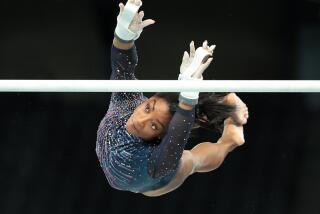U.S. diver Troy Dumais jumps for joy
The man is tired. You can hear it across the long-distance telephone line, the conversation punctuated by frequent yawns.
“A lot of sacrifices,” he says. “I’ve been doing this for a long time.”
Getting up early each morning to stop by the gym before work. Then hitting the pool each afternoon to practice. At 32, Troy Dumais rarely takes a vacation from diving.
“I don’t have that luxury,” he says. “When I take a break for a week, it takes me three weeks to get back to where I was.”
But when you ask him about quitting, about getting on with his life, the pace of the conversation quickens a beat. The thing is, Dumais still loves his sport.
And, he says, “I still have a dream.”
The Ventura native has won 35 national championships and five world championship medals. Add a half-dozen Pan American Games medals and a slew NCAA titles, and you have a career most athletes would kill for.
The only thing missing is Olympic glory. This summer, Dumais will attempt to qualify for a fourth consecutive Games, still chasing a spot on the podium.
“You don’t get old until you replace dreams with regrets,” he says, sounding every bit the elder statesman. “I don’t want to give up.”
USA Diving will hold its trials for the 2012 London Olympics in late June. With a string of solid results at international events, Dumais looks like a safe bet to make the team and set a record for most Olympics by an American diver.
Living and training in Austin, Texas, he ranks among the world’s top three-meter springboard divers, but the synchronized three-meter event represents his best chance in London. He and partner Kristian Ipsen won silver at the 2009 FINA world championships.
“Troy has actually gotten better,” says Ron O’Brien, a former Olympic diving coach and a respected name in the sport. “He has improved his leg strength and, because of that, he can do the harder dives.”
This is a tough time to be a diver if you are not Chinese. That country’s success has been such that no American — man or woman — has won an Olympic medal since 2000.
“It’s a big challenge for any diver in the world to keep up with them,” says Matt Scoggin, the University of Texas diving coach who works with Dumais. “We need to keep making strides in that direction.”
If he qualifies for London, Dumais will also have some personal history to overcome; the Olympics do not rank among his favorite memories.
All three of his previous trips ended with sixth-place finishes in the three-meter springboard. The synchronized event has not gone much better.
At the 2000 Sydney Games, he and partner David Pichler placed fourth. At the 2004 Athens Games, he and brother Justin fell from second to sixth on their final attempt.
Four years ago in Beijing, he competed only in the individual event and “put so much pressure on myself ... I killed myself,” he says.
It was a rough stretch for Dumais, who began pushing too hard and stopped enjoying the sport. As O’Brien explains: “It’s rare that someone can maintain world-class performance into their 30s. Usually, divers max out in their late 20s.”
Dumais bucked the trend by understanding that his body could no longer withstand a pounding. While working as a tutor for Texas athletes, he paid more attention to conditioning and streamlined his pool routine, choosing only a few difficult dives to practice each day.
“All that repetition wasn’t necessary,” Scoggin said. “He had to change to stay mentally fresh.”
At competitions, Ipsen saw a difference in the way his partner behaved.
“On the board it’s all business,” the Stanford freshman said. “But when we’re waiting, he’s talking to people, being more outgoing. He’s having more fun with it.”
Other factors have contributed to his longevity, including advances in training and sports medicine, as well as genetics — Dumais comes from a family of divers that also includes brother Dwight.
But for all the hard work and determination, fun might be the most important element leading up to London.
These days, Dumais insists he looks forward to practice. Only by recapturing the joy of his sport could he make another run at the Olympics.
“It’s been a roller-coaster ride,” he says. “But I haven’t been diving this well for a while.”
Another yawn follows as Dumais insists he is feeling confident about this summer, his mind and body “in a good place.”
If only he could find the time for a quick nap.
twitter.com/LATimesWharton
More to Read
Go beyond the scoreboard
Get the latest on L.A.'s teams in the daily Sports Report newsletter.
You may occasionally receive promotional content from the Los Angeles Times.











